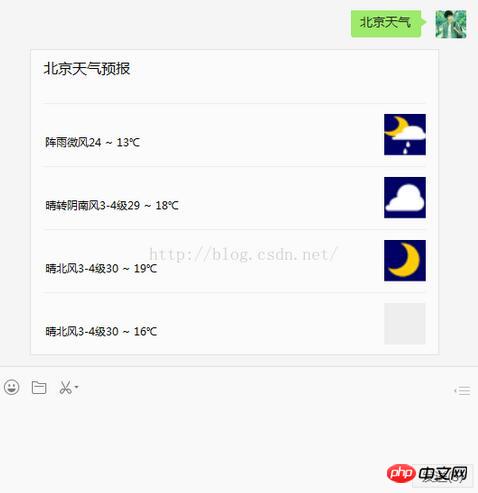Fonction de prévision météo de développement WeChat
Cet article présente principalement en détail les informations pertinentes des prévisions météorologiques Baidu développées par PHP WeChat. Il a une certaine valeur de référence. Les amis intéressés peuvent s'y référer
Les exemples de cet article sont partagés avec tout le monde. Le code de développement des prévisions météorologiques php WeChat Baidu est pour votre référence. Le contenu spécifique est le suivant
1 Connectez-vous à Baidu ak pour postuler : http://www.php.cn. /

2. Implémenter la fonction d'information météo
Weather.php
<?php
/**
* 使用百度天气预报接口获取城市天气信息案例实现
*/
//获取城市天气信息
function getWeatherInfo($cityName){
if($cityName == "" || (strstr($cityName,"+"))){
return "发送城市加天气,例如北京天气";
}
//获取到的ak
$ak = your ak;
//获取到的sk
$sk = your sk;
//调用接口
$url = 'http://api.map.baidu.com/telematics/v3/weather?ak=%s&location=%s&output=%s&sk=%s';
$uri = '/telematics/v3/weather';
$location = $cityName;
$output = 'json';
$querystring_arrays = array(
'ak' => $ak,
'location' => $location,
'output' => $output
);
$querystring = http_build_query($querystring_arrays);
//生成sn
$sn = md5(urlencode($uri.'?'.$querystring.$sk));
$targetUrl = sprintf($url,$ak,urlencode($location),$output,$sn);
$ch = curl_init();
curl_setopt($ch,CURLOPT_URL,$targetUrl);
curl_setopt($ch,CURLOPT_RETURNTRANSFER,1);
$result = curl_exec($ch);
curl_close($ch);
$result = json_decode($result,true);
if($result["error"]!=0){
return $result["status"];
}
$curHour = (int)date('H',time());
$weather = $result["results"][0];
$weatherArray[]=array("Title"=>$weather['currentCity']."天气预报","Description"=>"","PicUrl"=>"","Url"=>"");
for($i = 0;$i<count($weather["weather_data"]);$i++){
$weatherArray[] = array("Title"=>
$weather["weather_data"][$i]["data"]."\n".
$weather["weather_data"][$i]["weather"].
$weather["weather_data"][$i]["wind"].
$weather["weather_data"][$i]["temperature"],
"Description"=>"",
"PicUrl"=>(($curHour>=6)&&($curHour<
18))?$weather["weather_data"][$i]["dayPictureUrl"]:$weather["weather_data"][$i]["nightPictureUrl"],"URL"=>""
);
}
return $weatherArray;
}3. Mettre en œuvre un événement de message météo
<?php
/*
CopyRight 2016 All Rights Reserved
*/
define("TOKEN", "weixin");
/**
* 百度天气预报案例实现
* 实现思路:
* 1.申请ak、sk
* 2.使用天气预报接口
* 3.实现天气信息功能
* 4.实现事件响应功能
*/
$wechatObj = new wechatCallbackapiTest();
if (!isset($_GET['echostr'])) {
$wechatObj->responseMsg();
}else{
$wechatObj->valid();
}
class wechatCallbackapiTest
{
//验证签名
public function valid()
{
$echoStr = $_GET["echostr"];
if($this->checkSignature()){
header('content-type:text');
echo $echoStr;
exit;
}
}
public function checkSignature(){
$signature = $_GET["signature"];
$timestamp = $_GET["timestamp"];
$nonce = $_GET["nonce"];
$token = TOKEN;
$tmpArr = array($token, $timestamp, $nonce);
sort($tmpArr);
$tmpStr = implode($tmpArr);
$tmpStr = sha1($tmpStr);
if($tmpStr == $signature) {
return true;
}else{
return false;
}
}
//响应消息
public function responseMsg()
{
$postStr = $GLOBALS["HTTP_RAW_POST_DATA"];
if (!empty($postStr)){
$this->logger("R ".$postStr);
$postObj = simplexml_load_string($postStr, 'SimpleXMLElement', LIBXML_NOCDATA);
$RX_TYPE = trim($postObj->MsgType);
//消息类型分离
switch ($RX_TYPE)
{
case "event":
$result = $this->receiveEvent($postObj);
break;
case "text":
$result = $this->receiveText($postObj);
break;
default:
$result = "unknown msg type: ".$RX_TYPE;
break;
}
echo $result;
}else {
echo "";
exit;
}
}
//接收事件消息
public function receiveEvent($object)
{
$content = "";
switch ($object->Event)
{
case "subscribe":
$content = "欢迎关注Nicky的公众号 ";
$content .= (!empty($object->EventKey))?("\n来自二维码场景 ".str_replace("qrscene_","",$object->EventKey)):"";
break;
case "unsubscribe":
$content = "取消关注";
break;
}
$result = $this->transmitText($object, $content);
return $result;
}
//接收文本消息
public function receiveText($object)
{
$keyword = trim($object->Content);
//自动回复模式
if (strstr($keyword, "天气")){
$city = str_replace('天气','',$keyword);
include("weather.php");
$content = getWeatherInfo($city);
}
$result = $this->transmitNews($object, $content);
return $result;
}
//回复图文消息
public function transmitNews($object, $newsArray)
{
if(!is_array($newsArray)){
return;
}
$itemTpl = " <item>
<Title><![CDATA[%s]]></Title>
<Description><![CDATA[%s]]></Description>
<PicUrl><![CDATA[%s]]></PicUrl>
<Url><![CDATA[%s]]></Url>
</item>
";
$item_str = "";
foreach ($newsArray as $item){
$item_str .= sprintf($itemTpl, $item['Title'], $item['Description'], $item['PicUrl'], $item['Url']);
}
$xmlTpl = "<xml>
<ToUserName><![CDATA[%s]]></ToUserName>
<FromUserName><![CDATA[%s]]></FromUserName>
<CreateTime>%s</CreateTime>
<MsgType><![CDATA[news]]></MsgType>
<ArticleCount>%s</ArticleCount>
<Articles>
$item_str</Articles>
</xml>";
$result = sprintf($xmlTpl, $object->FromUserName, $object->ToUserName, time(), count($newsArray));
return $result;
}
//日志记录
public function logger($log_content)
{
if(isset($_SERVER['HTTP_APPNAME'])){ //SAE
sae_set_display_errors(false);
sae_debug($log_content);
sae_set_display_errors(true);
}else if($_SERVER['REMOTE_ADDR'] != "127.0.0.1"){ //LOCAL
$max_size = 10000;
$log_filename = "log.xml";
if(file_exists($log_filename) and (abs(filesize($log_filename)) > $max_size)){unlink($log_filename);}
file_put_contents($log_filename, date('H:i:s')." ".$log_content."\r\n", FILE_APPEND);
}
}
}
?>
C'est tout pour cet article. Tout le contenu, j'espère qu'il sera utile à l'étude de chacun, et j'espère aussi que tout le monde soutiendra Script Home.
Ce qui précède est le contenu détaillé de. pour plus d'informations, suivez d'autres articles connexes sur le site Web de PHP en chinois!

Outils d'IA chauds

Undresser.AI Undress
Application basée sur l'IA pour créer des photos de nu réalistes

AI Clothes Remover
Outil d'IA en ligne pour supprimer les vêtements des photos.

Undress AI Tool
Images de déshabillage gratuites

Clothoff.io
Dissolvant de vêtements AI

Video Face Swap
Échangez les visages dans n'importe quelle vidéo sans effort grâce à notre outil d'échange de visage AI entièrement gratuit !

Article chaud

Outils chauds

Bloc-notes++7.3.1
Éditeur de code facile à utiliser et gratuit

SublimeText3 version chinoise
Version chinoise, très simple à utiliser

Envoyer Studio 13.0.1
Puissant environnement de développement intégré PHP

Dreamweaver CS6
Outils de développement Web visuel

SublimeText3 version Mac
Logiciel d'édition de code au niveau de Dieu (SublimeText3)

Sujets chauds
 1393
1393
 52
52
 1207
1207
 24
24


